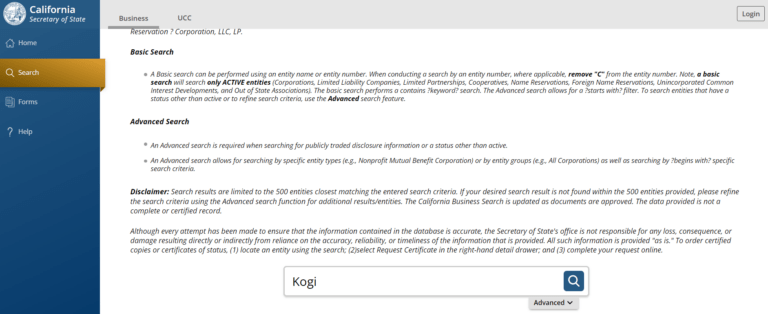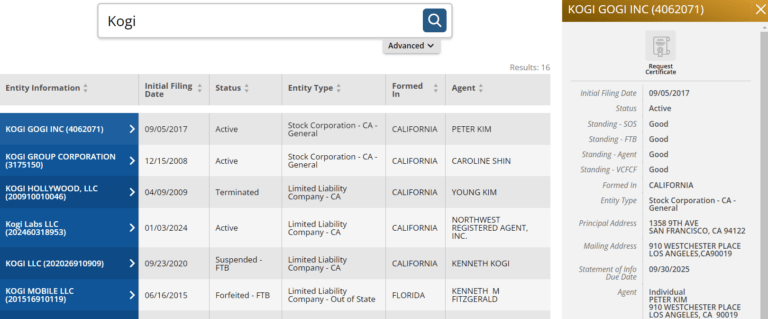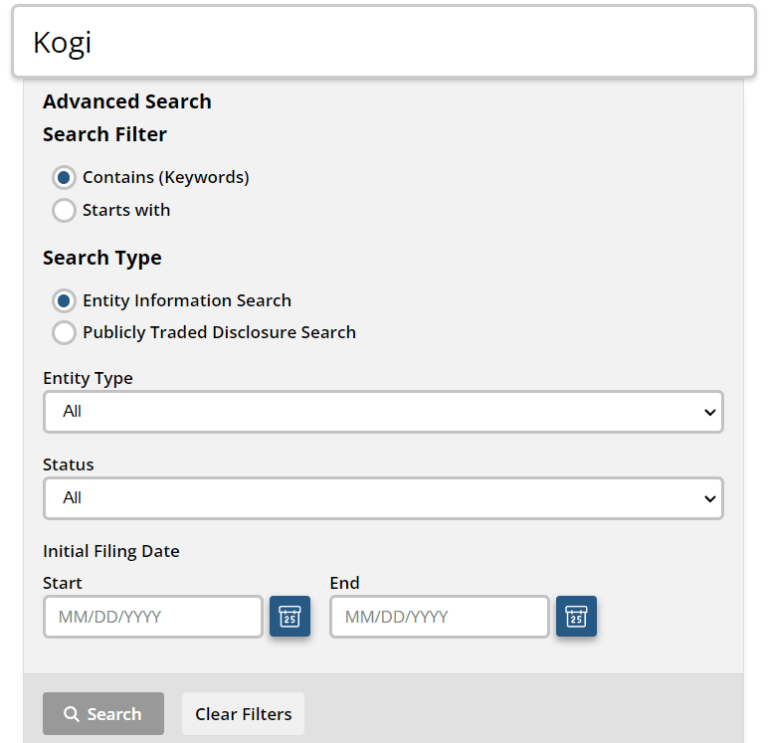Before you start an LLC in California, you must ensure your chosen business name is available in the Golden State.
Fortunately, California’s business entity search website is easy to use.
However, you must follow specific naming guidelines and take certain steps after registering your new business name to ensure no one else uses it.
Below, I’ll walk you through the process, tell you the guidelines, and provide additional resources that could help your fledgling business secure its intellectual property.
Why do you need to do a business entity search?
You can run a business name lookup to find information about LLCs, corporations, and other entity types registered in California.
That information could include the business name, address, years in operation, whether the company is active and operational, members’ names, and the current board of directors.
California state naming guidelines
You can’t register any name you like; I’m sure you understand how that could be a problem!
California has naming guidelines you must comply with; otherwise, the Secretary of State will refuse your LLC Articles of Organization application.
That also applies to any business or individual registering a fictitious business name (DBA) with their locations Registrar-Recorder/County Clerk’s office.
The California Secretary of State Business Formation Division provides a complete list of California’s business entity name regulations and additional statutory requirements and restrictions.
But it’s 20 pages long!
To save you time, here are the naming guidelines you need to know about when starting an LLC in California:
- Unique: Your chosen name must be unlike (and not overly similar to) any existing LLC names registered with the California Secretary of State.
- Required wording: It must contain the words limited liability company or an approved abbreviation like LLC, Ltd. Liability Co., or L.L.C.
- Restricted wording: You cannot use words or terms associated with banking, insurance, or medical institutions.
- Government affiliation: You cannot use words or phrases that could imply your business is a government department, such as the FBI, CIA, DEA, etc.
To ensure your name complies with California state naming guidelines, run a name search on the California Secretary of State’s online business search database.
Next, we’ll look at how you do it:
Conducting a business name search in California: Step-by-step guide with tips
Aspiring business owners who aren’t using a lawyer or an online LLC formation service must check that their name is available in California, fill in the correct information, and file the relevant paperwork.
Before jumping into the California business name database, you can also perform a California LLC search to confirm that your preferred LLC name is unique and compliant with state requirements. This step ensures your business formation paperwork will be accepted the first time and helps you avoid costly delays.
But before you jump over the California business name database, let’s look at how it works.
Helpful tips
- The search isn’t case-sensitive, and all letters are seen as uppercase.
- Do not add or remove spaces that aren’t in the name you are searching for.
- Single-word search provides a broader return of results.
- Select the search term “all” for entity status and entity type.
- When searching for an LLC by entity number, only enter the 12-digit number.
Okay, now let’s look at how to use the California Secretary of State`s business search database:
The page you arrive on after clicking the California Secretary of State’s online business search database is the one below:

Conduct basic entity search
For most name search queries, the basic entity search choice is adequate.
How to use it:
- Enter the entity name you wish to use and click search.
I will use my favorite food truck, Kogi, as an example:

Reviewing the results
You’ll see that several or more businesses with similar registered names appear, ranging from LLCs to corporations.

Next, click on the entity closest to your initial search:

Here, you’ll see all the relevant information about your chosen business entity, including whether it’s active, the entity type, whether it has good standing, the business address, when it was registered, and who owns it.
Here’s a closer look at the information:

The basic search only shows active entities, including LLCs, Limited Partnerships, Corporations, Cooperatives, and name reservations.
Advanced entity search
The advanced search function digs deeper and enables you to search for non-active entities and narrow the results by business type, filing date, status, etc.
Here’s what that looks like when using it for the Kogi food truck:

Pressing the advanced button leads you to the below page:

Perform a multi-state search
Using the National Corporation Directory Multi-State Search lets you widen your search and see if a California-registered LLC operates in another state. This service costs $25.
Fictitious name
A fictitious name (Doing Business As) is a trade name you can use for your business other than the LLC name you registered when filing your Articles of Organization with the California Secretary of State.
Sole proprietors can also use a DBA if their private name doesn’t suit their chosen niche.
You can check if your chosen DBA is available using the California Secretary of State’s online business search database.
However, you don’t register a DBA like an LLC name.
You file a DBA application with your county Registrar-Recorder/County Clerk’s office.
You can learn about how to file a DBA in California and use it by visiting the California Franchise Tax Board Guide to DBAs service or the CA.gov business portal.
Registering a DBA in California varies from county to county, but the average cost is $40.
California entity search fees
Forming an LLC in California costs $70, which includes your business name registration, but there are additional costs you must consider to ensure you keep within your start-up budget.
What can you do once you have an available business name?
Once you confirm your chosen business name is available, you can take 3 steps to ensure no one else uses it in California, nationwide, or online.
Consider name reservation
You can reserve a business name for up to 60 days using the California Secretary of State bizfileOnline.sos.ca.gov service; the fee is $10.
Doing so gives you time to create your LLC operating agreement and file your Articles of Organization, and during that time, no one else can register your name.
Consider trademarking your name
Trademarks stop anyone from using your business name to sell products or services in the United States.
You can trademark your business name, logo, slogan, or any phrase used to identify your business.
Another reason you might register a trademark is to confirm that no one else has; otherwise, you risk trademark infringement.
Search the United States Trademark and Patent Office‘s online database to register a trademark or check if your new name is available.
Consider domain registration
Registering a domain enables you to create an online presence for your new business, and it’s a crucial part of establishing your brand identity.
Search domain name registration websites to see if your new business name is available.
If it isn’t available as a .com, consider using a different Top-Level Domain (TLD) or adding a verb.
Conclusion
Now that you know how to register a business name in California, jump over to the California Secretary of State’s online business search database and begin the process.
Remember to check if your new business name is available to trademark and buy the domain.
But if all that still seems like too much work or you’re busy starting your new venture, you can always use our LLC formation service, which does everything for you.
FAQ
You do a business entity search to ensure your chosen name is available with the California Secretary of State’s office or to find information about an existing registered business.
Use the California Business Entities Search tool to see if your new name is available, or contact the Secretary of State’s office by phone at (916) 653-7244.
The fee for reserving an LLC name in California is $10.
To use a DBA in California, you must register it with your county clerk’s office.
For more information on using a DBA in California, visit the California Franchise Tax Board Guide to DBAs service or the CA.gov business portal.
California State naming requirements include:
Unique: Your chosen name must be unlike (and not overly similar to) any existing LLC names registered with the California Secretary of State.
Required wording: It must contain the words limited liability company or an approved abbreviation like LLC, Ltd. Liability Co., or L.L.C.
Restricted wording: You cannot use words or terms associated with banking, insurance, or medical
Government affiliation: You cannot use words or phrases that could imply your business is affiliated with a government department, such as the FBI, CIA, DIA, etc.


